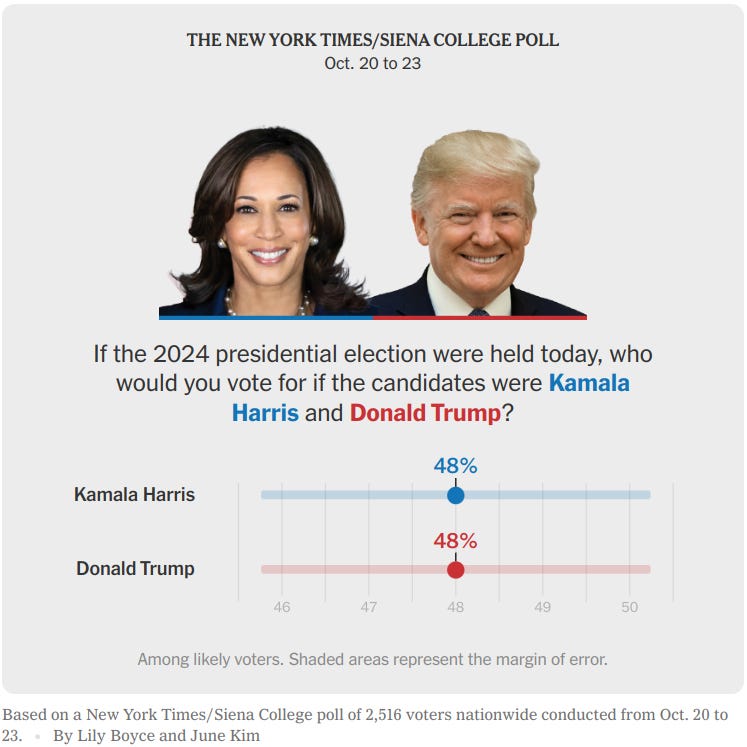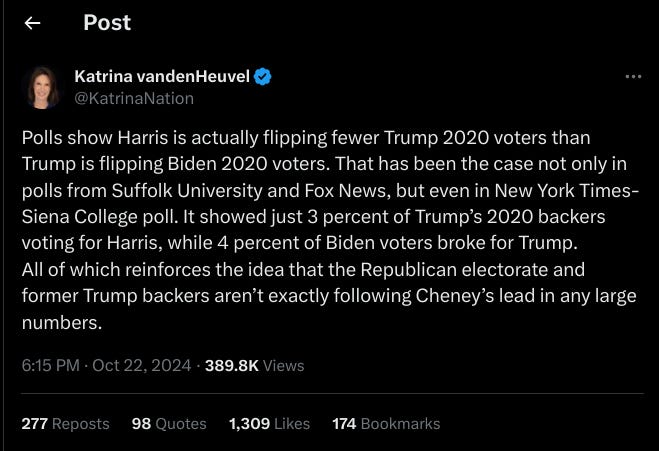AIPAC Doesn’t Have Time to Mount a Campaign Against Kamala Harris
Now is the time for Harris to pivot on Gaza.

I wanted to lift out a point I made in a previous essay, because I think it risks being overlooked.
This is the last week of the campaign. If there is any way to make up ground, this is the time in which to do so. This truism applies to both candidates.
We saw how Donald Trump means to close the deal during his campaign rally yesterday in Madison Square Garden. He means to use just about every dogwhistle and racist, sexist epithet to juice his numbers. This is the core of his campaign; and Trump, in familiar waters, is leaning his sail into the wind.


Kamala Harris has none of that. She doesn’t have rabid followers who have elevated her to a deity. She can’t tap into the same mucky psychological depths as her opponent by bringing up racist or gender-based stereotypes. Not only would that be fighting below the belt, she doesn’t have access to that realm of attack. Such a tack, were she even able to execute it, would also destroy her own image.
This is a decided disadvantage, quite the asymmetrical bind.
Compounding this is the fact that Harris and Trump are in a statistical dead heat. While Harris enjoyed widening margins about a month ago, with some swing-state polls showing her 5-7 points ahead (i.e., outside the margin of error), for the last few weeks those polls have been tightening.
The New York Times and Siena College conduct opinion polls and produce what are considered some of the most reliable numbers. Their final poll of the presidential season shows the two candidates tied at 48 percent.

What Harris needs to do is to find a way to break out of this malaise. As I said before, she needs to bring her own October surprise, one that is not about her opponent but about herself.
The issue that exerts the most drag on Harris, intra-party, is the issue of Gaza. Democratic response to Israel’s assault on Gaza was viewed by Biden advisers last year as a factor to ignore. Perhaps they figured that Israeli Prime Minister Benjamin Netanyahu would wind down long before the election season started in earnest.
The Uncommitted movement, something that we now simply take as part of the political landscape, was a huge leap into the unknown by specifically Democratic voters to express their disaffection and concern. Young people made their opposition to Biden’s policy toward Israel clear this spring.
Still, the Biden administration did their best to ignore that part of the party. And now the Harris campaign, largely picking up all the threads that Biden left hanging when he stepped aside, has continued this strategy. Instead, Harris and her team — some of whom were imported directly from the Biden campaign — have focused on peeling off center-right voters, ignoring their own base of voters.
This is a losing strategy. I noted in my previous essay the commentary by folks observing the campaign that, by courting Nikki Haley voters, Harris has changed the tenor of her campaign — a self-inflicted wound in a campaign driven primarily by vibes. Change the mood, change the game. She siphoned off the energy that was giving her campaign life.
As Katrina vanden Heuvel of The Nation posted on X (formerly Twitter), this switch in focus has cost the campaign. It simply isn’t working.
What can Harris do? She can state unequivocally that she will uphold and enforce U.S. law as it pertains to foreign policy. This is the barest minimum that she could say on the issue of Middle East policy, but it would be a seismic shift. It could resurrect the verve of her campaign.
There are certain swing states where the issue of Gaza doesn’t factor in at all. That’s important to recognize. But of seven swing states, there are some where the issue looms large (or, at least, could make the difference). Those states include Pennsylvania, Michigan, and Georgia, regions where Arab-American and Muslim-American voters are concentrated enough to wield influential electoral power.
The Road to the White House Intersects Michigan
As all politics are local, I have focused my attention this year on the dynamics in Michigan, my home state. I’m not a pollster, but I am closer to the ground here than other swing states. (Pennsylvania, for example, seems very remote to me, despite both being in the Midwest corridor.) And Michigan has been one of the swingiest of swing states in recent years, so nailing the dynamics here is quite important to understanding the presidential race nationally.
Arab-American and Muslim-American votes
As early as last November, Arab-American voters in Michigan underwent a sea change in terms of their support for the Democratic ticket. The same electorate that had gone for Biden in 2020 by margins upwards of 70% or more had turned to stone. Once he cast doubt upon the death toll coming out of Gaza, support for Biden fell through the ice, registering at 17% throughout the fall. Those numbers never recovered.
Many pundits, when Biden was still in the race, were convinced that this was the iceberg dead ahead. Michigan was key to any Democratic path to the White House.
Dynamics changed once Harris assumed the nomination, in that a few more paths opened up that could lead to an Electoral College win. Michigan was no longer absolutely crucial, but it still remained important. Certainly, fifteen electoral votes represent a big swing, and one would think that Harris would not want to leave those votes on the table.
Here we have a numbers game, how many votes Harris could win versus how many might be lost, and among which groups. Regarding Michigan, the BBC noted,
President Joe Biden won Michigan by a narrow margin of 2.78% in 2020 — about 150,000 votes — helping to propel him to the presidency.
In 2016, the state went to Trump by an even narrower margin of 0.23% against Hillary Clinton.
According to a recent poll conducted by Arab News and YouGov, 87% of Arab American voters nationwide intend to vote this year. In Michigan, the CBC (Canadian Broadcasting Company) reports,
There isn't high-quality polling on Arab American and Muslim voters, and the community is not a monolith — voters can identify with a range of racial or religious groups and differ culturally — but census data shows Michigan is home to more than 300,000 people with Arab American or North African ancestry.
Considering these numbers, it’s no wonder that Rep. Elise Slotkin, running for the Senate seat vacated by the retirement of Debbie Stabenow, remarked that Harris is polling “underwater” in Michigan. Many of those voters still harbor molten feelings toward Democrats and want to punish them for their handling of Gaza. The New Arab just this week reported:
[Thasin] Sardar [of the Islamic Society of Greater Lansing in Michigan] says Harris hasn’t earned the Michigan vote but understands that we need to make sure that Trump stays out of the White House, thus this means making a “pragmatic” but “less palatable” choice.
“I hope we send a strong message by denying her victory in Michigan yet hoping that Democrats prevail in the rest of the country,” he says.
To the outsider, this may sound like muddled messaging, but make no mistake: this is a movement. These voters are willing and actively pushing to take Michigan out of Harris’s win column.
The only way to neutralize the movement and recapture any significant portion of this voting bloc is for Harris to state that she will follow the law as it concerns matters of foreign policy. This simple statement not only will strengthen her image as a tough prosecutor devoted to the rule of law. It will dilute attack ads and commentary that has emerged painting the Democratic Party as a whole as scofflaws and bloodthirsty warmongers.
No other messaging can do this in such a short time span as between now and Election Day.
AIPAC as a functional restraint
The conventional wisdom has been that Harris’s hands are tied on the topic of Gaza, because she doesn’t want to seem to be alienating another important group of voters, Jewish Americans. It’s thought that an announced shift in policy would jeopardize her standing with a certain segment of that demographic — that is, with hard-line, pro-Israel supporters. Indeed, many people, including pundits, have openly speculated that Harris dares not brook choppy waters between herself and AIPAC, the influential Jewish-American lobby. (AIPAC stands for American Israel Political Affairs Committee.)
AIPAC is no joke. We’ve seen this year that the public affairs committee is willing to spend gargantuan amounts of money in order to defeat candidates seen as too willing to deviate from the Israeli policy status quo. Namely, AIPAC spent nearly $15 million to defeat Rep. Jamaal Bowman in New York, and it also spent about $9 million to dispatch Rep. Cori Bush in Missouri. These are not trivial amounts. These two representatives were defeated in their primaries. This type of deployment of funds is unheard of.

Still, AIPAC held its fire when it came to two other representatives who are known for their outspoken stance on U.S. policy toward Israel. Those congresspersons, Reps. Ilhan Omar of Minnesota and Rashida Tlaib of Michigan, did not face an influx of AIPAC opposition. Pundits reason this is because the lobbying group was picking and choosing, understanding that those representatives enjoy solid bases of support in their respective areas. Sometimes it is better to hold one’s fire than to expose areas of weakness.
So there are limits to AIPAC’s reach and influence. This should be obvious. Yet I’ve seen many, many comments over the past year (but especially in the last few months since Harris took over as standard bearer) that Democrats just can’t afford to brook AIPAC’s anger and possibly have them deploy their firehose of funds.
One, I think this is borderline anti-Semitic, as it accords nearly unlimited power to a group largely seen as primarily working for the advancement of Jewish interests. Why are people willing to entertain the idea that this one group holds ultimate power? I find it remarkable how many Democrats hold this idea without any sense of irony or cognitive dissonance. It’s just incredible.
New argument: run the clock
But let’s say that AIPAC would want to launch a campaign of opposition to Harris were she to come out and say she would enforce U.S. law. That seems unlikely, because it would be a bad look (to say the least) for AIPAC to attack someone for saying they would uphold the law. But let’s say they would want to.
In this last week of this compressed campaign season, AIPAC would not have time to allocate funds for the type of opposition ad campaign that they would need to run. They would need to produce the ads, distribute the ads, pay for running time, and launch the attack such that it would have an immediate effect.
I don’t think this is possible. One, logistically speaking, I don’t believe there’s enough time to coordinate these monies to create and launch such ads. But even if the group were able to accomplish that part of such a plan, one must remember that these swing states are saturated with political ads. It’s unlikely that such ads would even be able to break through.
Just like in the case of Reps. Omar and Tlaib, AIPAC would not want to be seen as spending money in an ultimately losing battle. They would want to hold their fire rather than expose themselves as ineffective.
So I think there is little to be lost and much to be gained indeed from Harris coming out boldly this week and saying that she will follow the law. This is the time to do it.







I appreciate your take on many issues but I don’t see Haley or her voters as center right. They seem solid right. Some of them like Liz Cheney do believe in democracy. So I see that as the only reason they are willing to vote for Harris. They don’t see themselves as white supremacists but they might need to look harder. I think substantial numbers of us don’t see ourselves as card carrying white supremacists yet some of our actions cause harm to non whites.
I hope to see US foreign policy with regard to Israel do a 180. I am sure there will be a political price to pay for that shift. I don’t see Harris announcing any change of foreign policy over the next few days.
I think down the stretch we will see her emphasizing reproductive rights and showcasing Trump’s vile plans should he manage to win. A Trump victory means everything everywhere will be worse.
Michigan voters who are trying to defeat Harris are working against their own interests. Or that is how it looks to me. Are they acting on principle? Most likely they are. If they defeat Harris, they will without question see far far greater suffering. This is not debatable even. Anyone who thinks a Trump win makes their lives better is in some sort of denial.
The Harris campaign has been so mismanaged that it makes me wonder if this really is all rigged, like pro wrestling. Presidential elections are about bringing out your base. Instead, Harris is insulting and condescending towards her ostensible base, while courting the sort of people that the DNC claimed were “fascist” twenty years ago. Seriously, who in the year of our Lord 2024 is going to be swayed by a Dick Cheney endorsement? It seems like many rank and file Republicans have completely memory holed GWB’s tenure, so it can’t be aimed at them. Rank and file Democrats aren’t going to be impressed, and neither will these “moderate suburban Republicans” that the Democrats have been chasing for the past thirty years. The only explanation I have is that it’s a signal to the other neocons that it’s time for them to switch teams again. I’ve long thought that while both parties are afraid of the Republican base, they actively despise the supposed Democratic base, and Harris’ bone-headed strategy proves it.
I looked on OpenSecrets to see how much, if any, AIPAC had invested in Harris. I couldn’t find anything because the list seems to mostly be congresspeople. I wish there was a way to filter by name, but that doesn’t seem to be possible. I did see that Joe Biden was the number one recipient of AIPAC money from 1990 to the present: https://www.opensecrets.org/industries/summary?cycle=All&ind=Q05&recipdetail=S
I also saw that J Street, a “liberal Zionist” lobbying organization, raised over $6 million for Harris to date: https://jstreet.org/press-releases/j-street-raises-over-6-million-for-harris-walz-campaign-consolidating-status-as-largest-jewish-organizational-fundraiser-for-kamala-harris/
AIPAC has no need to rally against Harris. She’s already bought and paid for. AIPAC and J Street are often pitted against each other in political discourse, but to me they’re just two sides of the same coin. Money aside, I also think that Harris genuinely believes that what Israel is doing is right, as does Biden. The money is nice, of course, but this is what they truly believe in. A much younger Biden once said that if Israel didn’t exist, it would have to be invented. No matter who wins, it’s genocide yesterday, genocide today, and genocide tomorrow. If you don’t want genocide, the beatings will increase until you learn to love it.